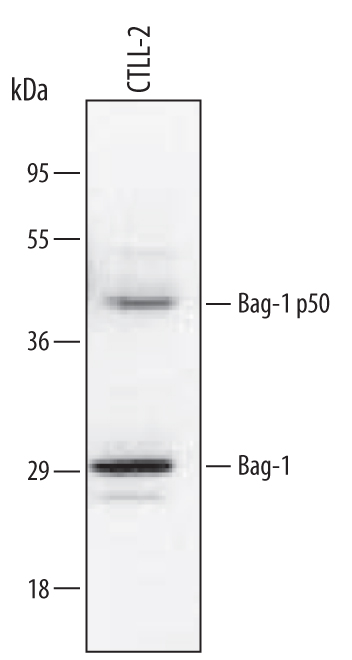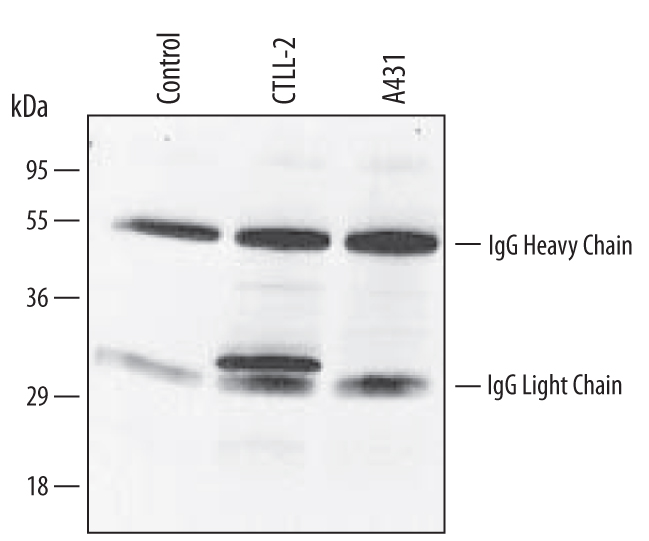Mouse Bag-1 Antibody Summary
Applications
Please Note: Optimal dilutions should be determined by each laboratory for each application. General Protocols are available in the Technical Information section on our website.
Scientific Data
 View Larger
View Larger
Detection of Mouse Bag-1 by Western Blot. Western blot shows lysates of CTLL-2 mouse cytotoxic T cell line. PVDF membrane was probed with 0.6 µg/mL of Goat Anti-Mouse Bag-1 Antigen Affinity-purified Polyclonal Antibody (Catalog # AF815) followed by HRP-conjugated Anti-Goat IgG Secondary Antibody (Catalog # HAF109). A specific band was detected for Bag-1 at approximately 32 and 50 kDa (as indicated). This experiment was conducted under reducing conditions and using Immunoblot Buffer Group 6.
 View Larger
View Larger
Immunoprecipitation of Mouse Bag‑1. Bag‑1 was immunoprecipitated from lysates (3 x 106cells) of CTLL‑2 mouse cytotoxic T cell line and A431 human epithelial carcinoma cell line following incubation with 5 µg Goat Anti-Mouse Bag‑1 Antigen Affinity-purified Polyclonal Antibody (Catalog # AF815) for 1 hour at 4 ºC. Bag‑1-antibody complexes were absorbed using Protein G (Sigma). Immunoprecipitated Bag‑1 was detected by Western blot using 5 µg/mL Mouse Bag‑1 Antigen Affinity‑purified Polyclonal Antibody (Catalog # AF815). The leftmost lane represents a control experiment where the antibody was incubated with no cell lysate. View our recommended buffer recipes for immunoprecipitation.
Reconstitution Calculator
Preparation and Storage
- 12 months from date of receipt, -20 to -70 °C as supplied.
- 1 month, 2 to 8 °C under sterile conditions after reconstitution.
- 6 months, -20 to -70 °C under sterile conditions after reconstitution.
Background: Bag-1
Product Datasheets
Citations for Mouse Bag-1 Antibody
R&D Systems personnel manually curate a database that contains references using R&D Systems products. The data collected includes not only links to publications in PubMed, but also provides information about sample types, species, and experimental conditions.
2
Citations: Showing 1 - 2
Filter your results:
Filter by:
-
Thio-2 inhibits key signaling pathways required for the development and progression of castration resistant prostate cancer
Authors: Neeb, A;Figueiredo, I;Bogdan, D;Cato, L;Stober, J;Jiménez-Vacas, JM;Gourain, V;Lee, II;Seeger, R;Muhle-Goll, C;Gurel, B;Welti, J;Nava Rodrigues, D;Rekowski, J;Qiu, X;Jiang, Y;Di Micco, P;Mateos, B;Bielskut?, S;Riisnaes, R;Ferreira, A;Miranda, S;Crespo, M;Buroni, L;Ning, J;Carreira, S;Bräse, S;Jung, N;Grä beta le, S;Swain, A;Salvatella, X;Plymate, SR;Al-Lazikani, B;Long, HW;Yuan, W;Brown, M;Cato, ACB;de Bono, JS;Sharp, A;
Molecular cancer therapeutics
Species: Viral
Sample Types: Whole Tissue
Applications: Immunohistochemistry -
BAG-1 Stabilizes Mutant F508del-CFTR in a Ubiquitin-Like-Domain-Dependent Manner
Authors: Filipa Mendes, Carlos M. Farinha, Verónica Felício, Paulo C. Alves, Isabel Vieira, Margarida D. Amaral
Cellular Physiology and Biochemistry
Species: Helicobacter apodemus
Sample Types: Cell Lysates
Applications: Western Blot
FAQs
No product specific FAQs exist for this product, however you may
View all Antibody FAQsReviews for Mouse Bag-1 Antibody
There are currently no reviews for this product. Be the first to review Mouse Bag-1 Antibody and earn rewards!
Have you used Mouse Bag-1 Antibody?
Submit a review and receive an Amazon gift card.
$25/€18/£15/$25CAN/¥75 Yuan/¥2500 Yen for a review with an image
$10/€7/£6/$10 CAD/¥70 Yuan/¥1110 Yen for a review without an image

